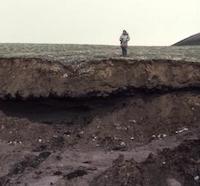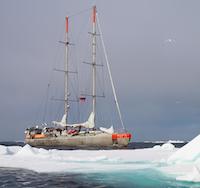200,000 ocean viruses | Sea-star opportunist | Keep on sitting | April 23, 2019 | SMCC Heads Up – Embargoed and recently published research with a Canadian focus, curated by SMCC for science journalists. Read more>
Increased screen time in preschool linked to inattention, ADHD 
PLOS One Published April 17, 2019 | 14:00 EDT (News releases from PLOS and University of Alberta) A study of more than 2,400 Canadian families suggests that among preschoolers, spending two hours or more of screen time per day is linked to clinically significant behavioural problems. Compared with children who had less than 30 minutes per day […]
Meet Gobihadros, the newest Mongolian hadrosaur 
PLOS One Published April 17, 2019 | 14:00 EDT (News release from PLOS) The complete skeletal remains of a new species of Mongolian dinosaur fill in a gap in the evolution of hadrosaurs. Gobihadros mongoliensis is represented by numerous specimens, including one virtually complete skeleton measuring almost three meters long. Anatomical analysis reveals that it doesn’t […]
Scientists ‘reverse engineer’ brain-cancer cells to find new treatment targets 
Cell Reports Published April 16, 2019 | 11:00 EDT (News release from University of Toronto) Glioblastoma is one of the most devastating forms of cancer, with few existing treatment options. It is also a leading cause of cancer-related death in children and young adults. Scientists have reverse engineered brain cancer stem cells gene by gene, uncovering multiple […]
April 16, 2019 | SMCC Heads Up 
New dinosaur | Screen time & ADHD | Reverse-engineered cancer cells | April 16, 2019 | SMCC Heads Up – Embargoed and recently published research with a Canadian focus, curated by SMCC for science journalists. Read more>
Yoghurt bacteria control HIV-associated intestinal inflammation by reducing white blood-cell lifespans 
PLOS Pathogens Published April 11, 2019 | 14:00 EDT (News release from PLOS) The increased survival of white blood cells called neutrophils is associated with changes in the intestinal microbiome of HIV-infected individuals. Lactobacillus bacteria, which are commonly found in yoghourt and probiotics, may shorten neutrophil lifespan, and could be an effective therapy to reduce intestinal inflammation […]
Fall freeze–thaw events depress Canada Jay reproduction months later 
Royal Society Open Science Published April 10, 2019 | 17:01 EDT (Brief from the Royal Society) Canada jays (Perisoreus canadensis) rely on perishable food cached in the fall to fuel late-winter reproduction. Forty years of breeding data from a population at the southern edge of the bird’s range show that frequency of fall freeze–thaw events leads […]
Martian methane mystery probed 
Nature Published April 10, 2019 | 13:00 EDT (News release from Nature Research Press) Early observations from the ExoMars Trace Gas Orbiter show that, in contrast to previous work, the orbiter did not detect methane on Mars, which raises questions about the reasons for these discrepancies. A second paper describes a rare Martian global dust storm, which […]
New imaging reveals previously unseen vulnerabilities of HIV 
Cell Host & Microbe Published April 10, 2019 | 11:00 EDT (News release from University of Montreal Hospital Research Centre) Researchers used a molecular “can opener” to expose parts of the HIV virus envelope that can be targeted by antibodies, revealing the virus’s inner structure and a previously unknown virus shape. The new information provides a […]
Can flipping coins replace animal experiments? 
PLOS Biology Published April 9, 2019 | 14:00 EDT (News release from PLOS) A coin toss has exposed a problem that may affect many biomedicine studies. In many of these studies, small sample sizes and frequent loose thresholds for accepting statistical significance can lead to high rates of false-positive results and overestimation of true effects. Contrary to […]
April 9, 2019 | SMCC Heads Up 
Mars probed | Bad news for Canada’s official bird | HIV innards revealed | April 9, 2019 | SMCC Heads Up – Embargoed and recently published research with a Canadian focus, curated by SMCC for science journalists. Read more>
Increased competition drives males to age faster 
Proceedings of the Royal Society B: Biological Sciences Published April 3, 2019 | 17:01 EDT (Brief from the Royal Society) If we fall apart as we age because we allocate so much energy to trying to reproduce that we don’t look after our bodies, then males that have to compete more vigorously should age faster. In […]
Losing a mating match boosts loser’s sperm competitiveness 
Proceedings of the Royal Society B: Biological Sciences Published April 3, 2019 | 17:01 EDT (Brief from the Royal Society) When researchers tested the mating success of winners and losers in a variety of mating competitions, they found that winners are better at acquiring mates, but losers perform better in sperm competition. These results have important […]
Slippery slopes: Climate change is reshaping the Arctic landscape 
Nature Communications Published April 2, 2019 | 11:15 EDT (News release from University of Ottawa) The number of landslides caused by melting permafrost ice on Banks Island, in the Canadian Arctic, increased from 63 in 1984 to 4,077 in 2013. More than 85 per cent of the slumps occurred just after four particularly warm summers. The […]

April 2, 2019 | SMCC Heads Up 
Slippery Arctic slope | Mating aging | Winners & losers | April 2, 2019 | SMCC Heads Up – Embargoed and recently published research with a Canadian focus, curated by SMCC for science journalists. Read more>
Early observations from near-Earth asteroid Bennu 
Nature Geoscience and Nature Astronomy Published March 19, 2019 13:30 EDT (News release from Nature Research Press) Early observations from instruments aboard NASA’s OSIRIS-REx spacecraft confirm the presence of widespread and abundant hydrated minerals on near-Earth asteroid Bennu and the unexpected presence of numerous, large boulders, suggesting that Bennu is between 100 million and one billion years […]

